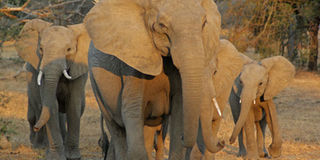Elephants in Selous Reserve face extinction, says WWF

Elephants in Selous Game Reserve. PHOTO|FILE
What you need to know:
Tanzania’s largest nature reserve was in the 1970s home to 110,000 elephants, but today only 15,000 remain and they are threatened by “industrial-scale poaching”.
Washington. Elephants in Selous Game Reserve could be extinct within the next six years if poaching continues at the current rate, the World Wildlife Fund (WWF) warned on yesterday.
Tanzania’s largest nature reserve was in the 1970s home to 110,000 elephants, but today only 15,000 remain and they are threatened by “industrial-scale poaching”.
The Selous “could see its elephant population decimated by 2022 if urgent measures are not taken,” the WWF said.
More than 30,000 African elephants are killed by poachers every year to supply illegal ivory, which is in high demand in the Far East.
Tanzania is among the worst-affected countries with a recent census saying the country’s elephant population fell by 60 per cent in five years to 2014. Selous Game Reserve is a tourist attraction destination contributing estimated $6 million a year to Tanzania’s economy, according to a study commissioned by WWF and carried out by an advisory firm, Dalberg. It is named after Frederick Selous, a British explorer, hunter and real-life inspiration for the H Rider Haggard character Allan Quatermain in King Solomon’s Mines.
“By early 2022 we could see the last of Selous’ elephants gunned down by heavily armed and well trained criminal networks,” the report said. The 55,000-square kilometre reserve in southern Tanzania was named a World Heritage Site by Unesco in 1982.
But it was put on a watch list in 2014 as poaching spiked, with six elephants killed every day and industrial activities, including oil and gas exploration, as well as mining, threatening the delicate environment.
WWF Tanzania country director Amani Ngusaru notes that the Selous’ value is dependent on its large wildlife populations and pristine ecosystems. “Achieving zero elephant poaching is the first step to setting Selous on a path toward fulfilling its sustainable development potential,” says Mr Ngusaru.




